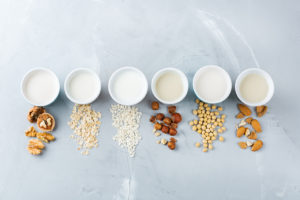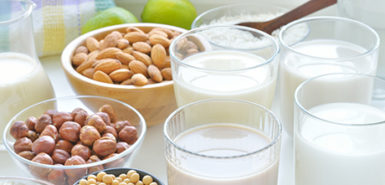
Taking a stroll down the dairy aisle, families are now encountering a large variety of plant and nut-based milks.
It can get a bit overwhelming.
While dairy alternatives all have “milk” right in the name, some are less than ideal sources of nutrition for growing children.
Families seek out alternative dairy products for a variety of reasons, often relating to health issues such as milk allergies or dairy intolerance. In some cases, parents may also want to adopt a more plant-based lifestyle, embracing veganism or certain forms of vegetarianism.
No matter the reason, it’s important to understand how these various products stack up on nutritional content.
Here’s a look at the common milk alternatives:
Protein
Kids rely on protein for growth and development. But when it comes to dairy alternatives, most fall short of the gold standard of cow’s milk.
Both soy milk and pea milk, however, do an excellent job—providing 8 grams of protein per cup. Hemp milk and oat milk provide moderate amounts of protein, with 4 grams and 2 grams, respectively.
Which milks are poor protein sources for children? Almond, macadamia nut, cashew, rice and coconut.
Vitamin D
Vitamin D is essential for growing children—their bodies rely on it for bone development and prevention of rickets. It’s important for parents to identify food sources that supply sufficient amounts of this essential vitamin.
Most dairy alternatives are fortified with healthy amounts vitamin D, but you’ll still have to double-check the nutrition facts label to be sure. Food manufacturers are not required to fortify their products with adequate vitamin D.
Calcium
Lower calcium intake can affect bone health in children. Fortunately, most dairy alternatives are fortified with a good amount of calcium.
The best milks in calcium content—ranked highest to lowest—are pea, oat, coconut, macadamia, almond, cashew, soy and hemp.
The verdict?
Many dairy alternatives have been fortified with vitamin D and calcium for children, but they typically don’t have enough protein.
If your child is getting adequate protein from other dietary sources, however, there’s no need to chuck the almond milk.
A single cup of soy milk or pea protein milk is nearly on par with a cup of cow’s milk when it comes to protein, calcium, vitamin D and fat content.
Consequently, soy milk and pea protein milk win the gold star for best alternative to cow’s milk, particularly for children’s diets. These are the best choices for families.
For those who read nutrition labels, try to choose a product that provides at least 90 calories per cup, 8 grams of protein per cup, 2.5 micrograms of vitamin D, 300 milligrams of calcium and around 5 grams of total fat.
 /a>
/a>
 /a>
/a>
 /a>
/a>